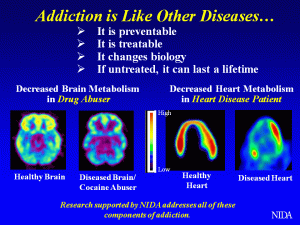Addiction research has clarified the definition of addiction which is now called substance use disorder SUD and considered a chronic brain disease. Over the last 30 years research has brought new understanding about how substances hijack and negatively impact brain function. This new information about the way the brain is affected, can now replace outdated beliefs and improve treatment and outcomes.
Addiction Research Challenges Outdated Myths
One common outdated belief is that addiction is a weakness that must be managed by abstinence and will power alone. Another common belief is that a stint in rehab (a 30, 60, 90 day program) will arrest substance use and restore normal life. The truth is there are many paths to recovery, and recovery is not a short term undertaking, but rather a life-long pursuit. It can be effectively treated just like any chronic disease. But first SUDs and their impact on the brain must be understood as a chronic illness that requires long-term maintenance and attention.

5 Ways Addiction (SUD) Is Similar To Other Chronic Diseases
Addiction is similar to other chronic diseases, like diabetes and heart disease, in the following ways:
- It is preventable
- It is treatable
- It changes biology
- It is progressive and gets worse over time
- If untreated, it can last a lifetime, and can even cause death
Simply put, addiction (SUDS) changes the brain and impairs the way it works. Just as cardiovascular disease damages the heart and changes its functioning.
Below is an image of the brain (left) and the heart (right).

These images show how scientists can use imaging technology to measure functioning of the brain and heart. Greater activity is shown in reds and yellows, and reduced activity is shown in blues and purples. Both the healthy brain and the healthy heart show greater activity than the diseased brain and heart, because both addiction and heart disease cause changes in function. In drug addiction, the frontal cortex in particular shows less activity. This is the part of the brain associated with judgment and decision-making (NIDA).





















